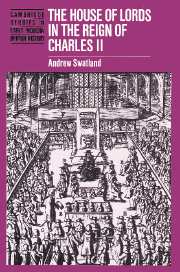Book contents
- Frontmatter
- Contents
- List of tables
- Acknowledgements
- List of abbreviations
- Note on the text
- 1 Introduction
- PART 1 FROM ABOLITION TO RESTORATION
- PART 2 MEMBERS AND THE BUSINESS OF THE HOUSE
- PART 3 KING, LORDS AND COMMONS
- 6 King and Lords
- 7 Lords and Commons
- PART 4 RELIGION
- PART 5 POLITICS
- Appendix 1 Temporal members of the House of Lords
- Appendix 2 The bishops, 1661–1681
- Index
- Cambridge Studies in Early Modern British History
7 - Lords and Commons
Published online by Cambridge University Press: 12 October 2009
- Frontmatter
- Contents
- List of tables
- Acknowledgements
- List of abbreviations
- Note on the text
- 1 Introduction
- PART 1 FROM ABOLITION TO RESTORATION
- PART 2 MEMBERS AND THE BUSINESS OF THE HOUSE
- PART 3 KING, LORDS AND COMMONS
- 6 King and Lords
- 7 Lords and Commons
- PART 4 RELIGION
- PART 5 POLITICS
- Appendix 1 Temporal members of the House of Lords
- Appendix 2 The bishops, 1661–1681
- Index
- Cambridge Studies in Early Modern British History
Summary
Scholars of the early modern period are increasingly studying parliament as a trinity comprising the king, the Lords and the Commons. Some recent works on the reign of Charles II emphasise the role played by all three in the enactment of legislation. Connections between the Houses have received less attention from historians. The only work to focus on the relations between the Lords and the Commons is A. R. Leamy's unpublished MA thesis. There was a multitude of links between peers and MPs, including the obvious ties of kinship and friendship, patronage and clientage as well as those of a local, electoral, religious and political nature. An analysis of bicameral links provides new insights into our understanding of later Stuart parliamentary politics. The first part of this chapter will briefly consider these connections, whilst the second will investigate that phenomenon of post-Restoration parliamentary politics: bicameral privilege disputes.
The bulk of parliamentary business was transacted on the floor of both Houses and in their respective committee rooms. Neither chamber operated in isolation from the other. At the opening of a session MPs assembled in the Lords' chamber to listen to the king's and Lord Chancellor's speeches. Normally at the close of a session MPs returned to witness the king declaring his assent to public and private bills. These formal occasions did not provide opportunities for members to exchange views: peers sat in their places and MPs crowded into the restricted space at the bar. But they did emphasise the tripartite nature of parliament.
- Type
- Chapter
- Information
- The House of Lords in the Reign of Charles II , pp. 116 - 142Publisher: Cambridge University PressPrint publication year: 1996



